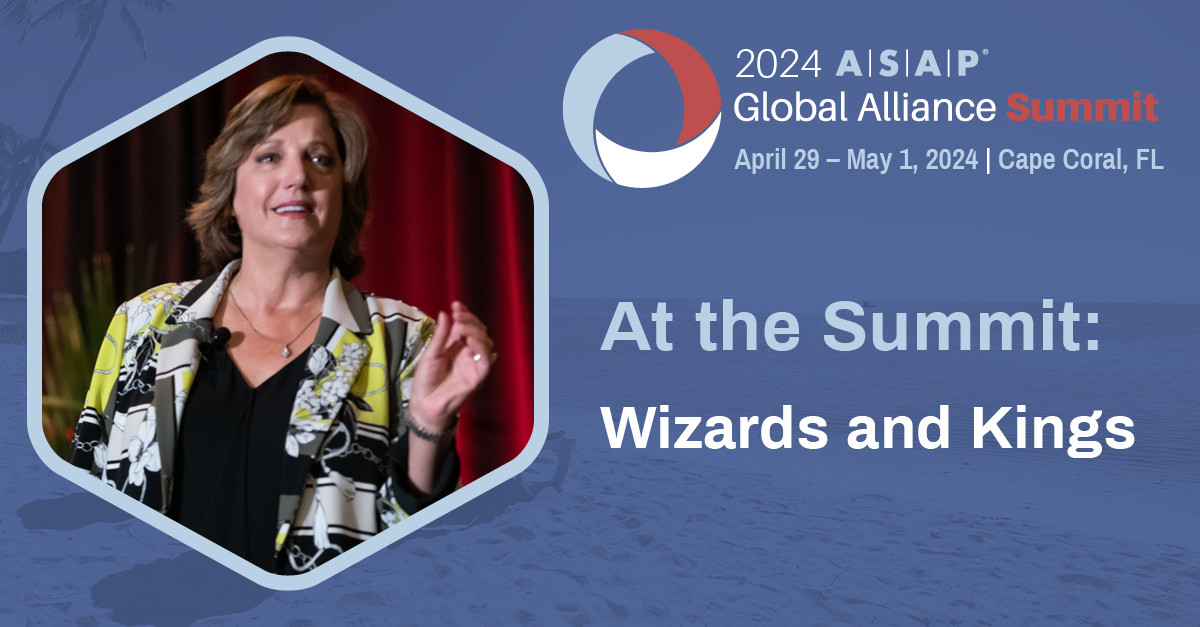Wizards and Kings
Much of the partnering world and the ASAP community assembled this morning for the kickoff of the 2024 ASAP Global Alliance Summit, held in Cape Coral, Fla. The conference got off to a great start with ASAP’s new president and CEO, Nicole Boston, CAE, giving us a few glimpses of what ASAP will have in store for its members and attendees in the very near future.
These new and upcoming items will include a needs assessment survey coming soon to ASAP members; more community building both online and otherwise, including ASAP Locals now forming in multiple locations; the news that after several years in Florida, ASAP’s next spring conference will be held somewhere in the western US, spearheaded by conference cochairs Nicole Colwell, chief alliance officer at the PraSaga Foundation, and Drew Quinlan, CA-AM, senior vice president of global sales at Formstack. In addition, there was a video announcement of the finalists for this year’s Alliance Excellence Awards, made by awards committee chair Prof. Ard-Pieter de Man, CSAP, PhD, of the Vrije Universiteit Amsterdam.
Following those glad tidings, Quinlan—who is also the vice chair of ASAP’s board of directors—took the stage to introduce the morning keynote. He said that the Summit is “always one of my favorite conferences. I feel like I learn more here than anywhere else.” Mentioning the array of resources ASAP has to offer, from publications to education to conferences to certification, Quinlan said, “I live and breathe these things on a daily basis.”
The Keyword Is “Partnering”
Then all eyes turned to the keynote speaker, Janet Schijns, CEO and cofounder of JSG, a consultancy that advises companies and their senior leaders on how to thrive in an increasingly partner-led and ecosystem-driven world.
Schijns maintained that “partnering changes everything quickly,” and that “We are beyond the point of no return. There will be no such thing as going it alone.”
That probably comes as no surprise to the audience of alliance and partnering professionals in the room, many of whom have been saying this for years—and practicing what they preach. But Schijns said that unfortunately, those in the C-suite of many companies have been slow to understand the new world that’s rapidly taking shape around them, and more specifically the role of partnering and ecosystems and the “unheard-of ways to partner” that are forming.
“Partnering will be the new profit word in every single company,” she said.
Staying Late in the Old School? You Missed the Bus
And while partnering professionals are by and large aware how much has changed in and around partnering and alliances in just the last two years—propelled by the pandemic, remote digital tools, remote integration technologies, different business buying behaviors, AI and ML, the rise of data-driven decisions and data privacy concerns, and more—Schijns said their CROs and their fellows in the corner offices have not yet recognized the shift or the role partnerships and ecosystems are increasingly playing in it.
“You have to have alliances working quickly or you miss things,” she said. What is often missed is the shift from “1 + 1 = 2” (or even 3) alliances to larger, more complex, “multi-threaded” ecosystem partnerships; she referenced a recent deal she helped facilitate involving Infosys that included upwards of 30 partners.
"We’re still partnering old school,” Schijns lamented, focusing on getting a product to market and selling it rather than marketing largely taking over from sales, enhanced by coselling motions, codevelopment, integration, and services. In this world, she said, the GSIs will win—at least some of them, because in an environment where “trust is the final frontier,” the GSIs like Infosys, EY, Accenture, and the like become “the one shop in town everyone wants to buy from.”
In a business world where “control is king,” Schijns said that companies that learn how to partner and truly collaborate, to build trust and share and blend capabilities, will create a world where “control is both king and queen.”
Alliance Wizards Sure Can Read a Room
The “final piece of the puzzle,” she said, is that companies must invest in employee experience, customer experience, and ultimately partner experience if they expect to have continued growth. (Which just happens to be the subject of the newly released second edition of Partners Are the Customer Experience by Nancy Ridge, CA-AM, of Ridge Innovative, and Norma Watenpaugh, CSAP, of Phoenix Consulting Group, published by ASAP, for which I’ll insert a shameless plug here.)
To close, Schijns told a story about a king and a wizard. After a series of failed wizards who were all put to death, the king finally found one he liked—he correctly predicted such events as droughts and invaders raiding the castle, but this prescience earned him the enmity of the rest of the king’s court. It looked like he too might be destined to die since the other courtiers were clamoring for him to be thrown off the battlements.
When the king sought to trap the wizard by asking him to foretell his own future, the wizard calmly replied that he was at peace, since he would never have to experience the king’s death—he would die three days before the king himself, he said. That put a quick end to any talk of the wizard’s execution.
“That wizard was Merlin, and Merlin knew how to read a room,” Schijns said. “The king was your CEO, by the way.”
In the Generation of the Ecosystem, Schijns concluded, “The wizard now is you. You have the skills. So be the person who tells the truth. You’ll end up serving several new kings, until you yourself become king.”
If the rest of the ASAP Global Alliance Summit is as captivating as this keynote, it should be a royal flush! Stay abreast of all things Summit by checking the ASAP Blog this week and in weeks to come.

